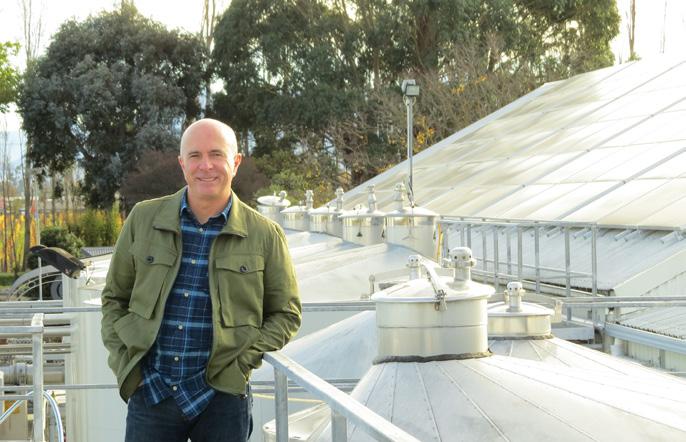
4 minute read
Good Stuff
Making good gains at Lawson’s Dry Hills
SOPHIE PREECE
Advertisement
WHEN LAWSON’S Dry Hills started investing in sustainability, plenty of eyebrows were raised about the cost, bother and bureaucracy. “But the once sceptics are now champions,” says general manager Sion Barnsley, 10 years after the small wine company achieved its IS0 14001 international environmental standard. “It brought real discipline around decision making, rather than just taking the easy option. And you see the benefits throughout the whole business as a result.”
These days sustainability is simply part of Lawson’s DNA, Sion told guests at the 2021 Cawthron Marlborough Environment Awards, where the company won the wine industry category, sponsored by Wine Marlborough. “It’s not something we need to police, because staff think through the process thoughtfully.”
Awards judges noted that sustainability is “not an add on” at Lawson’s Dry Hills. “It is integral to managing their business, from growing the grapes to exporting the wine.” The judges were also impressed that sustainability decisions at Lawson’s “survive the business evaluation test, even if not directly profit making”. Cost savings are weighed up against the right thing to do for the environment and to uphold the brand, they say in their report. “Lawson’s Dry Hills don’t have deep pockets or wealthy overseas funders, but they show how it is possible to invest in sustainability measures and be profitable.”
Last year Lawson’s installed 200 solar panels that supply 30% of the company’s power needs, with payback expected within eight years. And last winter, in recognition of the burgeoning demand for lighter footprint wine, the company launched its Inviniti brand, with ‘certified sustainable’ proudly printed on the front label. That move recognises the fact that consumers want to know the sustainable stories behind their wine and food, and plays to Lawson’s strengths, with more than a decade spent reducing waste, water and power, while setting aside vineyard area for pastures, beehives, and native plantings.
Sion says it’s increasingly easy to make the decision to be sustainable, with consumer and community buy-in to reduced emissions. But in the early days, Lawson’s was moving well ahead of the curve, and the increased cost of ‘good’ business was harder to get past accountants.
Fortunately, Sion was the accountant. He grew up in Marlborough’s wine industry and was already linked to Lawson’s, as his parents were growers and initial investors in the company, along with Ross and Barbara Lawson. His father, David Barnsley, started Winepress in 1991, and Sion recalls being tasked with the folding of the newsletter when he came home for visits.
After leaving school, Sion went away to work in accounting and finance, coming back in March 2000 to join Lawson’s Dry Hills as business manager, becoming general manager in 2009. He says the company was one of the first to get on board with Sustainable Winegrowing New Zealand, but he believed they could do better than meeting those requirements, by using ISO14001 to bring more rigour to the measurement and reduction of environmental impacts.
And the results are fairly remarkable, with continuing efficiencies, including a 30% drop in winery waste to landfill since the inception of ISO14001. Bottles are sourced from Visy in Auckland, with up to 60% recycled content, and all other packaging is scrutinised for its necessity and its ability to be recycled, including the use of biodegradable pallet wrap. The company is part of the Packaging Forum, a voluntary levy-based organisation with an aim to have all packaging reusable, recyclable or compostable by 2025.

Sion says it is alarming to see the standard rate of energy and water consumption in wineries, when he knows better levels are achievable. “It’s a concern because we all have to manage the resource we have and we know how limited it is.” Sustainability measures have “come into their own” and make both economic and environmental sense, says Sion. “I am a bit surprised that there are not more New Zealand wineries following the same journey.”
In the vineyards, Lawson’s has dropped its herbicide use to twice a year and is phasing out synthetic fertiliser, which is being replaced by seaweed spray and effective microorganisms (EM). Meanwhile they have set aside 4.5 hectares of plantable vineyard land on Lawson’s Waihopai Valley property for pasture, beehives, and native plantings, while a spring fed wetland is being cleared of weeds and extended for native plantings. At their Blind River property in the Awatere Valley, another 4ha block is being planted in natives as well, increasing biodiversity and providing habitat for birdlife.
Earlier this year, Lawson’s Dry Hills achieved Tōitu CarbonZero certification by achieving ISO14064, making it the only wine company in the country to achieve both ISO accreditations. Sion acknowledged that it is increasingly hard to make continued gains, with easier efficiencies already plucked. “We are hitting a bit of a brick wall at the moment and working even harder to make perhaps smaller gains. You don’t stand still in this field.”
But winning at the Cawthron Marlborough Environment Awards is another reminder of how important those gains are, particularly in the modern market. News of the win was welcomed more warmly than any wine award announcements Lawson’s have made, with particular interest from buyers in Europe, says Sion. “It’s opened up new opportunities for us.” The Cawthron Marlborough Environment Awards field day at Lawson’s Dry Hills will be held on Friday November 12.






